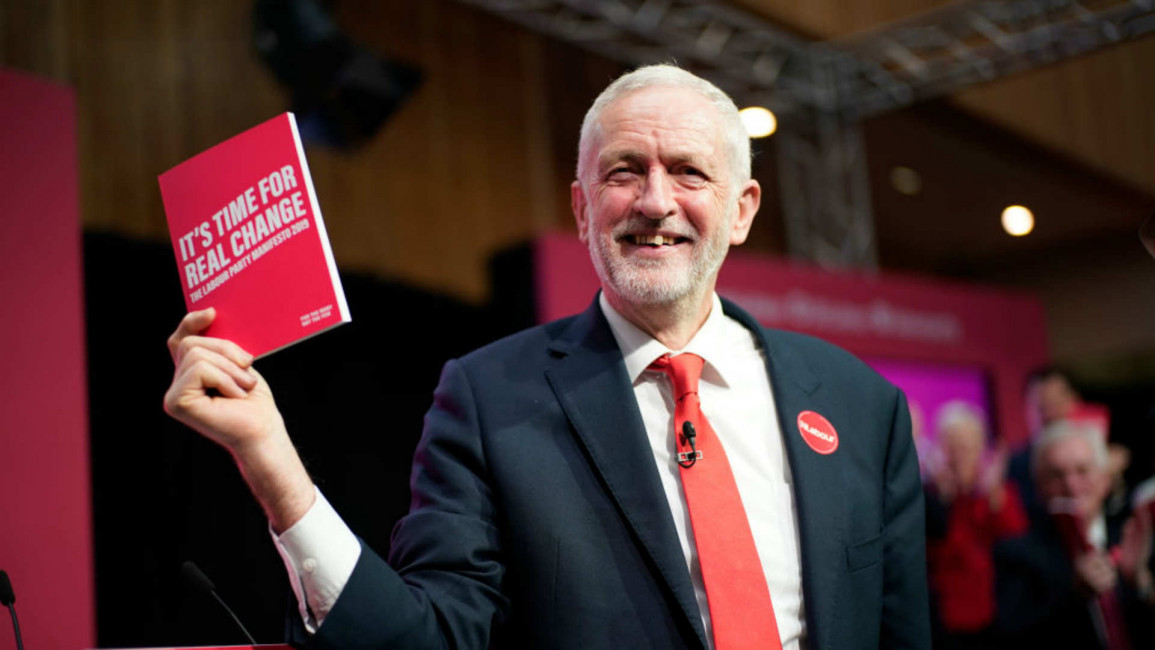
Labour manifesto kisses goodbye to Blair's toxic legacy
The manifesto pledges 'A New Internationalism' that would mean a more accountable government through the creation of a War Powers Act, which would prevent any prime minister from committing to "conventional military action" without the explicit agreement of parliament.
It also promises a review of British colonialism, and the impacts on the violence and insecurity left behind in formerly colonies.
Taken together, these initiatives would mean a radical step towards Britain starting the very long journey of assuming responsibility for the economic and political instability that has plagued many of the nations it historically looted, enslaved and/or exploited.
Furthermore, it would move away from neocolonial endeavours in the form of military 'interventions', such as those in Afghanistan, Iraq and Libya over the last few years.
Also worth noting is that the manifesto doesn't just rest on 'reviews' and 'audits' of imperialist practices past and present. It explicitly commits to suspending arms sales to Saudi Arabia, Yemen and Israel. It recognises British complicity in the sale of "arms used in violation of the human rights of Palestinian civilians" and commits to "conduct a root-and-branch reform of our arms exports regime so ministers can never again turn a blind eye to British-made weapons being used to target innocent civilians".
 |
We've come a long way since the days of a Labour Party that wages war in Iraq |  |
Anti-racist and anti-war campaigners have grown tired of tokenistic gestures from British politicians on the death and destruction of brown and black communities both at home and abroad. But this initiative would actively suspend some of the destruction that the military industrial complex-sustained by the British state, while new policies are formed.
Years of Tory rule have seen an acceleration in arms sales to Saudi Arabia, a policy which has directly contributed to the deaths of thousands of Yemenis. Such a commitment by the Labour Party is refreshing and urgent in light of the destruction and famine brought on by the war. It is also an important step in repairing the murderous legacy left behind by New Labour in the Middle East.
These pledges also point to the impact that grassroots campaigners and actions taken by groups such as Campaign Against the Arms Trade (CAAT) and War on Want have had on the important pledges by the Labour Party, in what is potentially the most decisive election of our lifetime.
Twitter Post
|
The new manifesto also breaks new ground regarding Labour policy on the occupation of Palestine.
In light of what has felt like relentless attacks on Corbyn's pro-Palestine portfolio and the Palestine Solidarity movement more widely, it is important to see this mention, especially with a Conservative Party that has failed to condemn or hold the Israeli government to account for its occupation and recent bombardment of the Gaza strip, the continued expansion of settlements and the continued denial of Palestinian basic rights.
Read more: What Labour's women can learn from their US sisters, Tlaib and Omar
Rather, the Tories have actively celebrated the Balfour declaration of 1917 - the an endorsement by the British government at the time of the Zionist movement in Palestine - and continued to maintain privileged economic, political, and military relations with Israel.
Speaking to Electronic Intifada, Ben Jamal, director of the Palestine Solidarity Campaign, said that Labour needs to go further including "recognising the illegality of Israeli settlements by implementing a ban on the import of settlement goods."
As Asa Winstanley pointed out, "since he first ran for party leadership in 2015, Corbyn has been subjected to a torrent of manufacturted claims about an 'anti-Semitism crisis' in Labour. This has led him to watering down many of his previous positions, including explicit support for the BDS movement."
The fact that Labour has held strong on these points has much to do with the strong campaign among the party membership, which led to the passing of such policy at its national conferences - both this year and last.
The manifesto also takes a position on immediate foreign policy challenges. These include the recent Israeli attacks on Gaza which left at least 34 people dead, and the bombing of a hospital and refugee camp in northern Syria by Iranian forces and the Syrian regime, which took place hours prior to the document's release. Corbyn-led Labour is showing the party can respond to issues as and when they happen.
For many, a robust Labour policy on Syria will be particularly important. Corbyn - who previously met with Assad - has faced staunch criticism over his lack of explicit support for the Syrian people in their opposition to the regime, instead expressing greater concern over a potential British military intervention into Syria.
The manifesto of course does not go into detail about what the UK's relationship to Assad's dictatorship would be, should the Labour Party be elected to office.
However, the manifesto as well as the party's transformation and political commitments more widely point to the fact that we've come a long way since the days of a Labour Party that wages war in Iraq, and uses it as a basis to introduce draconian counter-terrorism policies at home.
 |
Labour is the only party that provides the potential for real solidarity |  |
It also demonstrates the impact of hundreds of thousands of people who decided that they were tired of the party being used to strengthen racism, the arms industry, wage war, and normalise the oppression of people across the globe.
While there are still gaps in policy, and questions around implementation, one thing can be certain. Labour is the only party that provides the potential for real solidarity, and a break from a British foreign policy that has in the past supported gratuitous western interventions, supported dictatorships, and exhibited a total disregard for the lives of millions across the Global South.
Local and national campaigns have influenced local councils and leaders, and this has fed into the policies and direction of votes at Labour's conferences. These campaigns have provided the political education more widely on questions of international solidarity. That is how we have reached this point, and it is how we will continue shaping Labour and Corbyn's politics in power.
The manifesto is a sign of how far we have come, and how effective our struggles have been. It is only more mobilisation, more action, and more initiative at the grassroots however, that will deliver the goods.
Malia Bouattia is an activist, a former president of the National Union of Students, and co-founder of the Students not Suspects/Educators not Informants Network.
Follow her on Twitter: @MaliaBouattia
Opinions expressed in this article remain those of the author and do not necessarily represent those of The New Arab, its editorial board or staff.




